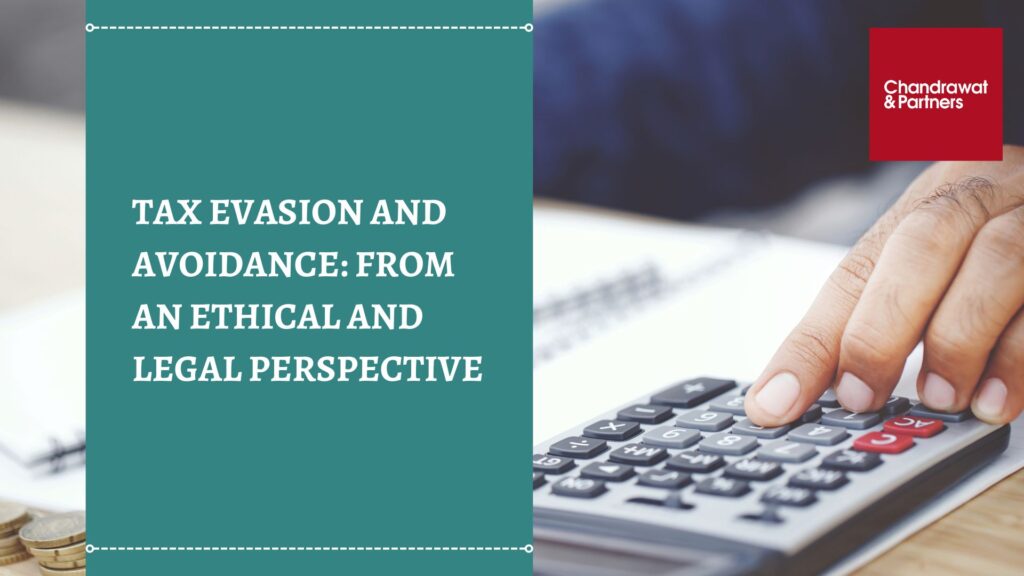Tax evasion and avoidance: From an ethical and legal perspective
Abstract
Tax evasion is the term used to describe the unlawful act of failing to disclose income, concealing assets, or making up deductions in order to lower tax obligations. Contrarily, tax avoidance refers to the legal practice of structuring one’s financial affairs to reduce tax liabilities. While tax avoidance is lawful but potentially immoral, tax evasion is unethical and is a crime. Governments have the authority to alter tax rules to stop particular tax evasion strategies that is deemed harmful.
Although the terms “tax evasion” and “tax avoidance” are sometimes used interchangeably, their ethical and legal perspectives differ. Tax avoidance and evasion are complicated issues with broad ramifications for people, companies, and governments. Governments rely on taxes as a major source of funding for public services including infrastructure, healthcare, and education. Taxes can sometimes be a burden for taxpayers, and many try to reduce their tax obligations.
The ethical and legal ramifications of tax evasion and avoidance have come under more scrutiny in recent years, particularly in light of the global economy and multinational enterprises. To combat tax evasion and avoidance, governments and tax authorities around the world have been enacting stronger legislation, closing loopholes, and enhancing openness and accountability. Therefore, it is crucial for taxpayers, tax experts, and policymakers to comprehend the distinctions between tax evasion and tax avoidance as well as their ethical and legal ramifications.
From an ethical perspective
Tax evasion
- Social contract violation: Tax evasion is the willful avoidance of paying taxes to the government. Due to the social contract’s expectation that people and companies pay their fair share of taxes to support public goods and services, this might be considered a breach of that agreement.
- Violating the principles of fairness and equality: By allowing people or businesses to avoid paying their fair share of taxes to society, tax evasion can be considered as violation of the principles of fairness and equality. Because of this, the tax burden may not be distributed fairly, with sincere taxpayers carrying an excessive amount of the burden.
- Undermining the social contract: Tax evasion has the potential to undermine the social contract, which is the implicit pact between the people and their government to uphold the law and support societal progress. Tax evasion can destroy public confidence in the tax system and threaten the social contract that binds society as a whole.
Tax avoidance
- Criminal offence: Tax evading is unlawful in the majority of jurisdictions and is regarded as a criminal offence. It entails willfully giving false information, concealing income, or keeping assets hidden in order to avoid paying taxes that are legitimately due. If found, tax evaders risk fines, penalties, and possibly incarceration.
- Violation of tax laws: In order to make sure that people and corporations pay their fair share of taxes, governments enact tax laws and regulations. Tax evasion entails breaking these rules. Tax evasion on purpose is a violation of these rules and can have legal repercussions.
- Enforcement by tax authorities: It is legally required for tax authorities to look into and bring cases of tax evasion to court. Authorities have the power to carry out audits, levy fines, and file lawsuits against tax evaders. Tax evasion can lead to legal action, which may include civil and criminal fines.
From a legal perspective
Tax evasion
- Anti-avoidance measures: To tackle aggressive tax planning and close legal loopholes, certain jurisdictions have put anti-avoidance measures into place. To prevent potential legal repercussions, taxpayers should be aware of these steps and make sure their tax planning methods adhere to the letter and spirit of the law.
- Changing tax laws: Because tax laws and regulations are susceptible to change, what is currently allowed tax avoidance may turn out to be prohibited in the future to make sure that their tax planning tactics are legal, taxpayers should stay current on the most recent tax rules and regulations.
Tax avoidance
- Legality: As long as tax avoidance complies with all applicable rules and regulations, it is generally accepted that it is legal. Taxpayers have the freedom to employ legitimate strategies to reduce their tax obligations, such as utilizing tax deductions, credits, and exemptions, so long as law breaking is not involved.
- Tax avoidance: Tax avoidance is frequently seen as a type of tax planning, where taxpayers proactively manage their financial affairs to formally reduce their tax due. Within the confines of the law, taxpayers have the right to engage in legal tax planning.
- Disclosure and compliance: Typically, tax avoidance entails providing tax authorities with all pertinent information and upholding all legal obligations, such as filing truthful and comprehensive tax returns. Tax avoidance is typically regarded as legal so long as taxpayers are honest and uphold their legal commitments.
To sum up
Although the goal of tax evasion and tax avoidance is the same that is, to lower a person’s tax liability the two are distinct depending on the methods involved. The term tax avoidance refers to the practice of abusing legal loopholes to obtain benefits that the law did not intend. Tax evasion, on the other hand, refers to illegal measures taken to lessen the tax burden and is punishable by harsh legal consequences. Tax avoidance rules are being developed to prevent typical methods of tax avoidance, but once implemented, tax evasion is the only method that is unlawful. Considering the significance, which is to pay the tax obligations, a lot of people pay their taxes after taking particular deductions in an effort to lower the overall amount that has to be paid. Understanding the distinction between tax avoidance and evasion is crucial for both individuals and businesses, as is adhering to all applicable tax rules and regulations.
For more information or queries, please email us at
enquiries@chandrawatpartners.com




